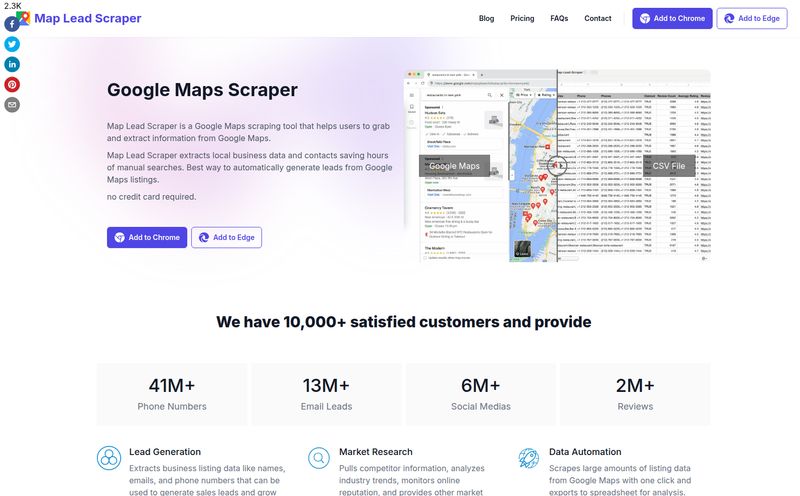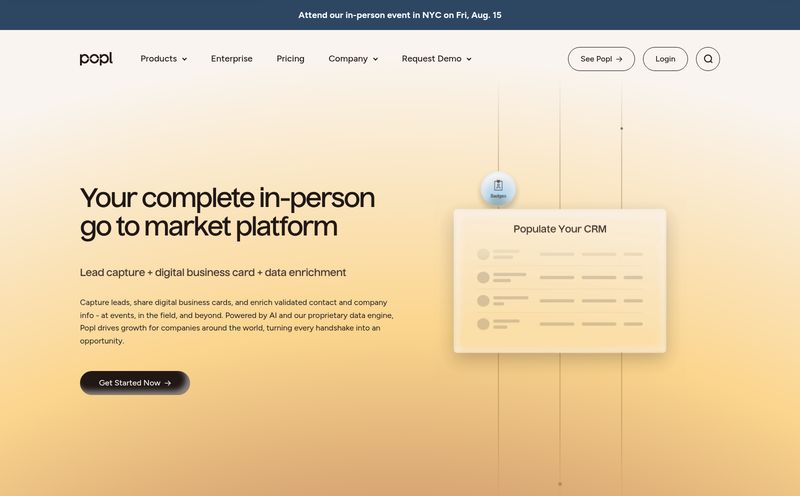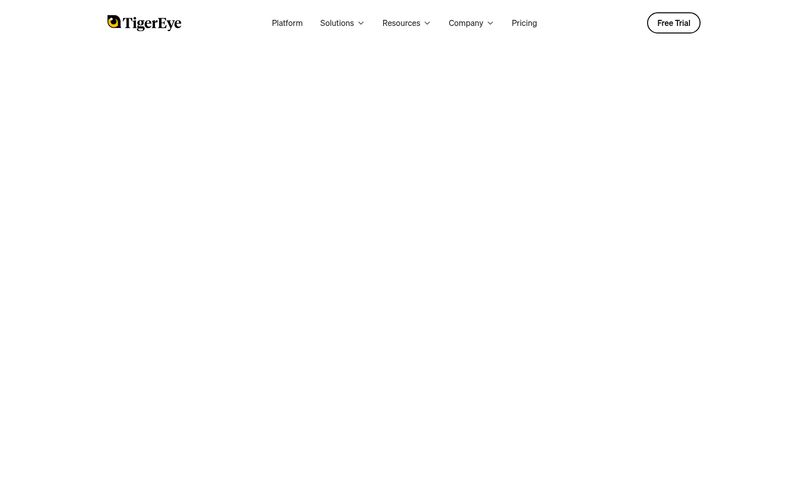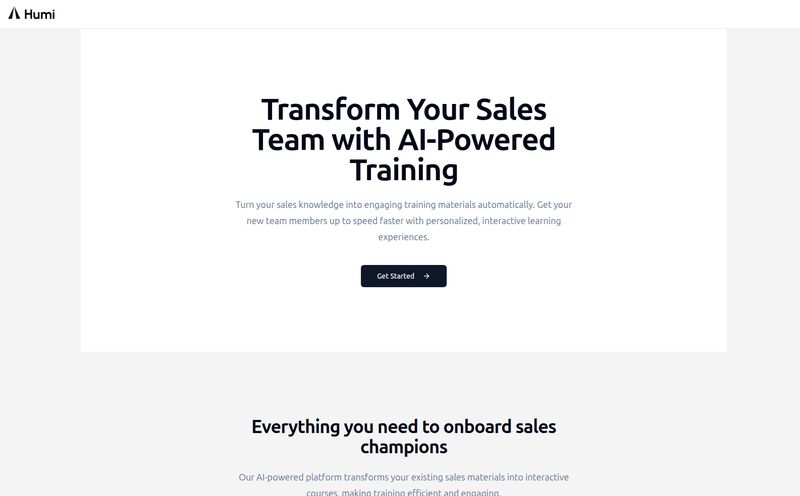How many of us in the sales and marketing world have looked at our company's CRM and felt… nothing? It’s supposed to be this beating heart of customer knowledge, a single source of truth. But more often than not, it feels like a data graveyard. A digital filing cabinet where information goes to be forgotten. We meticulously log calls and update contact info, but the actual relationship—the context, the connections, the human element—gets lost in a sea of custom fields.
It's a problem I've complained about over countless lukewarm coffees with other industry folks. The 'R' in CRM, for Relationship, has always felt more like an aspiration than a reality. So, when I stumbled upon a platform named Centralize that boldly claims to be “The ‘R’ in your CRM, if it actually worked,” my curiosity was officially piqued. A bold claim. A very, very bold claim. But is it just clever marketing, or are they actually onto something?
I decided to take a look under the hood. What I found was pretty interesting.
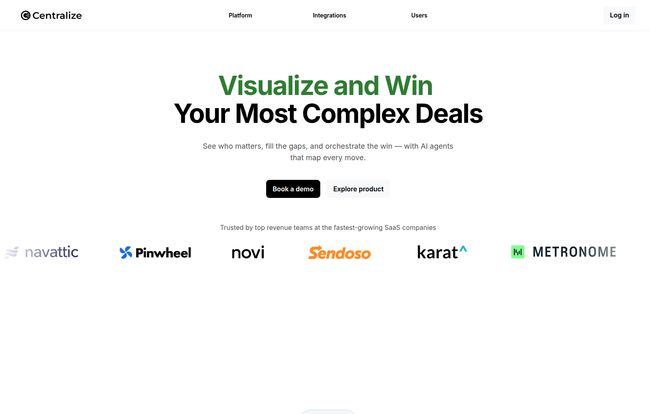
Visit Centralize
So, What Exactly is Centralize?
In a nutshell, Centralize isn't trying to replace your Salesforce or HubSpot. Thank goodness, because another data migration project is the last thing any of us needs. Instead, it acts as an intelligent layer that sits on top of your existing systems. Think of it as an AI-powered chief of staff for your entire revenue team. It pulls in data from all the places where customer conversations actually happen—your emails, calendar invites, call logs, messages, and of course, LinkedIn—and syncs it with your CRM data.
The result? It aims to create a genuine 360-degree view of your customers and accounts. It's not just about who you know, but how you know them, who they know, and what they’re talking about. It’s designed to connect the dots that we, as humans, just don't have the time or the cognitive bandwidth to connect on our own, especially in complex enterprise deals with a dozen stakeholders.
The Big Problem Centralize Wants to Solve
The core issue is data fragmentation. Your top sales rep has a fantastic relationship with a VP, but all that context lives in their email outbox. Your marketing team is targeting an account for an ABM campaign, but they don't know that your customer success manager has a weak signal that the account might be an upsell risk. The information is all there, somewhere in the company's digital ether, but it’s siloed. It’s useless.
Centralize is built on the premise that this siloed approach is killing deals. In today’s market, especially with enterprise SaaS, you're not selling to one person. You're selling to a committee. Identifying, understanding, and influencing that entire buyer committee is the whole game. Doing that from a static contact list in your CRM is like trying to navigate a city with a map from 1995. You have the street names, but you're missing the traffic, the construction, the new one-way streets... you're missing the reality of the situation.
A Closer Look at the Features
This is where things get practical. It's one thing to talk about a 360-degree view, but how does the platform actually deliver it? Based on what I've seen, it boils down to a few core functionalities.
Automated Research and True Relationship Intelligence
This is the foundation. Centralize automates the grunt work of account research. Instead of having your reps spend hours digging through LinkedIn profiles and past email threads, the AI does it for them. It aggregates relationship insights across sources, identifying key stakeholders, mapping out organizational charts, and—this is the cool part—gauging the strength of existing relationships. It can tell you if your connection to the CFO is strong (lots of recent, positive interactions) or weak (a single email exchange six months ago). That context is everything.
Network-Led Intros: Your Sales Superpower
Okay, this is the feature that made me sit up straight. We all know a warm introduction is worth its weight in gold. A cold call has a success rate of what, 2%? A referral is closer to 40% or more. Centralize actively maps your entire company’s network to find the warmest path into a target account. It might discover that your marketing director used to work with the person you’re trying to reach, or that an advisor on your board is a LinkedIn connection. It surfaces these paths and makes asking for that intro a no-brainer. For any B2B company not leveraging its collective network, you're just leaving money on the table.
Dynamic Call Strategies and Job Change Alerts
The platform doesn’t just give you data; it suggests what to do with it. It generates dynamic prep plans for calls based on the specific needs and personas of the people you're meeting with. More importantly, it provides real-time notifications for things like job changes. When a champion of your product moves to a new company, that’s not a lost contact; it's a golden opportunity for a new sale. Being the first person to congratulate them and offer help at their new gig is a massive advantage.
It Plays Nice with Salesforce
Let's face it, if a new tool doesn't have a seamless SFDC integration, it's dead on arrival in most enterprise companies. Centralize seems to understand this. The promise is that it enriches your existing Salesforce data rather than competing with it, allowing teams to work within the environment they're already comfortable with. This reduces the friction of adoption, which is a huge hurdle for any new software.
Who is Centralize Actually For?
The platform seems tailored for go-to-market teams at B2B companies, especially those dealing with complex, long sales cycles. It's not just for one role, which I find compelling.
- For Sales Reps: It's about efficiency and effectiveness. Less time researching, more time selling with actionable intelligence.
- For Sales Leaders: It provides a clearer view of the pipeline for deal reviews and one-on-ones. No more guessing about the health of a deal; you can see the relationship map.
- For Marketing: It helps align ABM strategy with actual sales activity and network strengths. Imagine launching a campaign and knowing exactly who on your team can get you a warm intro.
- For Account Management & Customer Success: It’s a tool for identifying upsell opportunities and staying on top of stakeholder value to prevent churn.
My Honest Take: The Good and The Could-Be-Better
No tool is perfect, right? From my perspective as someone who’s seen a lot of tech come and go, here's my breakdown.
The Strong Points
The biggest pro is the core concept itself: focusing on the relationship network. It's a smart, targeted approach to a very real problem. The automation of research is a massive time-saver, and the ability to leverage an entire company’s network for warm introductions is, frankly, a game-changer. It shifts selling from a lone-wolf activity to a team sport.
The Potential Hurdles
Like any platform of this nature, its effectiveness is directly tied to the quality of the data you feed it. Garbage in, garbage out. Getting everything synced up initially—emails, calendars, CRM—will require some setup and buy-in from the team. I also suspect there’s a bit of a learning curve to truly get the most out of it. It's not just a simple dashboard; it’s a new way of thinking about your sales process. Teams will need to be trained to trust and act on the insights the AI provides.
So, What's the Centralize Pricing?
Ah, the million-dollar question. Or, hopefully, less. If you've been searching for a pricing page, you won't find one. This is pretty standard for enterprise-focused SaaS platforms. Pricing is almost certainly custom and based on factors like the number of users, the scale of your data, and the specific features you need.
To get a number, you'll have to do what the website suggests: Book a demo. This allows them to understand your needs and give you a tailored quote. While I always prefer transparent pricing, this approach makes sense for a high-touch, enterprise-level product.
Is Centralize the Future of Sales Intelligence?
Look, the hype around AI in sales tech is deafening right now. It's easy to be skeptical. But Centralize feels different. It's not trying to be a magical black box that spits out deals. It's a tool designed to augment human intuition and relationships, not replace them. It's focused on solving a very specific, very painful problem that has plagued CRMs since their inception.
Will it work for everyone? Probably not. If you're a small team with a simple sales process, it might be overkill. But for enterprise teams juggling complex deals with dozens of contacts and siloed information, it could be the missing peice of the puzzle. It could be the tool that finally, truly puts the 'R' back where it belongs.
Frequently Asked Questions
- 1. What is Centralize?
- Centralize is an AI-powered relationship intelligence platform for enterprise sales teams. It integrates with your CRM, email, calendar, and other sources to provide a 360-degree view of your customer relationships and help you win complex deals.
- 2. Does Centralize replace Salesforce?
- No, it's designed to work with and enhance your existing CRM, like Salesforce (SFDC). It provides an intelligence layer on top of the data you already have, making your CRM more powerful.
- 3. How does Centralize help find warm introductions?
- The platform maps the collective network of your entire company, analyzing connections from LinkedIn, emails, and calendars. It then identifies the strongest and most direct path for an introduction to a key stakeholder at a target account.
- 4. Is Centralize suitable for small businesses?
- While any business could benefit from better relationship intelligence, Centralize is primarily designed for enterprise B2B companies with complex sales cycles and larger go-to-market teams.
- 5. Is the data integration process difficult?
- There is an initial setup process to sync data sources like your CRM, emails, and calendars. The effectiveness of the tool depends on this integration, so some initial effort is required, which is typical for platforms of this type.
